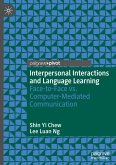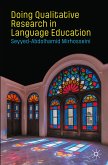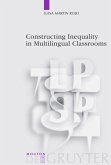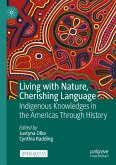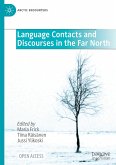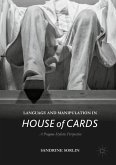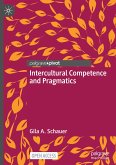Multilingual TESOL: De-constructing and Re-constructing Power 'in,' 'of,' and 'for' Language Classrooms
Herausgegeben:Raza, Kashif; Ustuk, Özgehan; Reynolds, Dudley
Multilingual TESOL: De-constructing and Re-constructing Power 'in,' 'of,' and 'for' Language Classrooms
Herausgegeben:Raza, Kashif; Ustuk, Özgehan; Reynolds, Dudley
- Gebundenes Buch
- Merkliste
- Auf die Merkliste
- Bewerten Bewerten
- Teilen
- Produkt teilen
- Produkterinnerung
- Produkterinnerung
The edited book delves into promoting multilingualism in TESOL classrooms. It discusses classroom approaches across the Global South and North through the lens of power and how the construction of power influences what is and is not learned in a classroom. It explores power negotiation, identity construction, and language policy in three sections. The chapters address language revitalization, mother-tongue literacy, and building the social capital of languages other than English. The book challenges pre-service and in-service teachers and researchers to take a broader look at learner support,…mehr
Andere Kunden interessierten sich auch für
![Interpersonal Interactions and Language Learning Interpersonal Interactions and Language Learning]() Shin Yi ChewInterpersonal Interactions and Language Learning46,99 €
Shin Yi ChewInterpersonal Interactions and Language Learning46,99 €![Doing Qualitative Research in Language Education Doing Qualitative Research in Language Education]() Seyyed-Abdolhamid MirhosseiniDoing Qualitative Research in Language Education69,54 €
Seyyed-Abdolhamid MirhosseiniDoing Qualitative Research in Language Education69,54 €![Constructing Inequality in Multilingual Classrooms Constructing Inequality in Multilingual Classrooms]() Luisa Martín RojoConstructing Inequality in Multilingual Classrooms179,95 €
Luisa Martín RojoConstructing Inequality in Multilingual Classrooms179,95 €![Living with Nature, Cherishing Language Living with Nature, Cherishing Language]() Living with Nature, Cherishing Language31,99 €
Living with Nature, Cherishing Language31,99 €![Language Contacts and Discourses in the Far North Language Contacts and Discourses in the Far North]() Language Contacts and Discourses in the Far North38,99 €
Language Contacts and Discourses in the Far North38,99 €![Language and Manipulation in House of Cards Language and Manipulation in House of Cards]() Sandrine SorlinLanguage and Manipulation in House of Cards91,99 €
Sandrine SorlinLanguage and Manipulation in House of Cards91,99 €![Intercultural Competence and Pragmatics Intercultural Competence and Pragmatics]() Gila A. SchauerIntercultural Competence and Pragmatics23,99 €
Gila A. SchauerIntercultural Competence and Pragmatics23,99 €-
-
-
The edited book delves into promoting multilingualism in TESOL classrooms. It discusses classroom approaches across the Global South and North through the lens of power and how the construction of power influences what is and is not learned in a classroom. It explores power negotiation, identity construction, and language policy in three sections. The chapters address language revitalization, mother-tongue literacy, and building the social capital of languages other than English. The book challenges pre-service and in-service teachers and researchers to take a broader look at learner support, classroom impact, learning objectives, assessment and policy goals, and de-constructing power in ways that allow more equitable re-constructing. This book provides valuable insights for researchers, teacher educators, and trainers engaged in multiculturalism studies, multilingual TESOL, language education, and decolonization.
Produktdetails
- Produktdetails
- Verlag: Springer / Springer Nature Singapore / Springer, Berlin
- Artikelnr. des Verlages: 978-981-96-9277-4
- Seitenzahl: 360
- Erscheinungstermin: 7. November 2025
- Englisch
- Abmessung: 241mm x 160mm x 25mm
- Gewicht: 649g
- ISBN-13: 9789819692774
- ISBN-10: 9819692776
- Artikelnr.: 74340800
- Herstellerkennzeichnung
- Springer-Verlag KG
- Sachsenplatz 4-6
- 1201 Wien, AT
- ProductSafety@springernature.com
- Verlag: Springer / Springer Nature Singapore / Springer, Berlin
- Artikelnr. des Verlages: 978-981-96-9277-4
- Seitenzahl: 360
- Erscheinungstermin: 7. November 2025
- Englisch
- Abmessung: 241mm x 160mm x 25mm
- Gewicht: 649g
- ISBN-13: 9789819692774
- ISBN-10: 9819692776
- Artikelnr.: 74340800
- Herstellerkennzeichnung
- Springer-Verlag KG
- Sachsenplatz 4-6
- 1201 Wien, AT
- ProductSafety@springernature.com
Kashif Raza has a Ph.D. in Educational Leadership, Policy, and Governance from the University of Calgary, Canada, an M.A. in TESOL from Oklahoma City University, USA, and a Law degree from the University of Punjab, Pakistan. He is currently a Social Sciences and Humanities Research Council (SSHRC) of Canada Postdoctoral Fellow at the University of British Columbia. Kashif has worked with multilingual learners in four different contexts (Canada, Qatar, USA, and Pakistan) and has taught, developed, and supervised EAP and ESP-Law courses. He currently serves on the Nominating Committee of the TESOL International Association and has previously served as a co-chair of Program Administration Interest Section and a co-chair of the Governance Review Working Group. His research interests include language policy and planning, bi/pluri/multilingualism, TESOL leadership, education law, transnational migration, and South Asian diaspora in Canada. Özgehan U¿tuk is a language teacher, teacher educator, and researcher, and currently works as a research assistant professor in the Department of English and Communication at the Hong Kong Polytechnic University. He chaired the TESOL International Association’s Research Professional Council from 2022 to 2024. He has recently co-edited "A Sociopolitical Agenda for TESOL Teacher Education" (Bloomsbury Academic, 2024) and "Building a Culture of Research in TESOL" (Springer, 2024). His research includes classroom-based and practitioner studies and focuses on language teacher education, professional development, teacher identity, and classroom discourse. Dudley Reynolds is a senior associate dean for Education and Teaching Professor of English at Carnegie Mellon University Qatar. A teacher and researcher of multilingual language learners for over 35 years working primarily with learners of English, he served as the president of TESOL International Association in 2016-2017. His research addresses language education policy, developmental patterns in additional language learning, curricular and pedagogical approaches to literacy development, teacher education, and learning. Recent editorial contributions include Handbook of multilingual TESOL in practice (Springer, 2023) and policy development in TESOL and multilingualism: Past, present, and the way forward (Springer, 2021). He is the 2023 recipient of TESOL International Association’s James E. Alatis Award for Service to TESOL.
Rethinking Power Dynamics in Multilingual TESOL: De-constructing and Re-constructing Power in , of and for Language Classrooms.- Part I: The Power in Language Classrooms.- Ideological Clashes in Becoming: TESOL Student Teachers Attempts to Deconstruct Power in the Real and Imagined Classroom.- Whose Classroom? Teaching Reading to Multilingual Adolescents.- A Cross-Case Analysis: Latinx and Chinese Emergent Bilinguals Develop Cultural and Linguistic Identities.- (Re)constructing Power in the Language Classroom via Portfolio Assessment: Facilitating Multilingual Students Linguistic and Cultural Competence.- A Multilingual Person can Cross Languages to Communicate Easily : An Adult English Learner makes Meaning of/from Critical Classroom Materials.- Part II: The Power of Language Classrooms.- Language Proficiency and Linguistic Citizenship: Rethinking Multilingual TESOL through an Emotional Geography of Languages.- (Re)Creating Multilingual TESOL Classroom: Insights from Pakistani Undergraduate Education Reform Policy.- A Critical Review of Multilingual Policies and Researchers Voices About the Power of English in Language Classrooms in India.- Making Strides to Center Multilingual Learners: Fostering Equitable Pedagogies as Monolingual White Teachers.- Part III: The Power for Language Classrooms.- Resisting Monolingualism through Critical Autoethnographic Narratives: Insights from Two Teacher Education Contexts.- Translanguaging in the Japanese Tertiary CLIL Classroom: Exploring Teacher Perceptions and Practices.- Decolonizing TESOL Classrooms: A Critical World Englishes-Informed Pedagogy.- Promoting Multilingualism through Jamaican Creole in the Japanese EFL Classroom: Jamaican Educators' Attitudes and Experiences.- Harnessing the Power of Language: Enhancing TESOL Classrooms through Linguistic Landscape.- Articulating Capillary Power through Humoristic Translanguaging: A Case Study on Sociolinguistics as a Multilingual TESOL Course.- Granting Agency: Re-constructing Power for and with Australian Aboriginal EAL/D Learners.- Tracing the Power in Multilingual Teacher and Learner Identity Construction.
Rethinking Power Dynamics in Multilingual TESOL: De-constructing and Re-constructing Power in , of and for Language Classrooms.- Part I: The Power in Language Classrooms.- Ideological Clashes in Becoming: TESOL Student Teachers Attempts to Deconstruct Power in the Real and Imagined Classroom.- Whose Classroom? Teaching Reading to Multilingual Adolescents.- A Cross-Case Analysis: Latinx and Chinese Emergent Bilinguals Develop Cultural and Linguistic Identities.- (Re)constructing Power in the Language Classroom via Portfolio Assessment: Facilitating Multilingual Students Linguistic and Cultural Competence.- A Multilingual Person can Cross Languages to Communicate Easily : An Adult English Learner makes Meaning of/from Critical Classroom Materials.- Part II: The Power of Language Classrooms.- Language Proficiency and Linguistic Citizenship: Rethinking Multilingual TESOL through an Emotional Geography of Languages.- (Re)Creating Multilingual TESOL Classroom: Insights from Pakistani Undergraduate Education Reform Policy.- A Critical Review of Multilingual Policies and Researchers Voices About the Power of English in Language Classrooms in India.- Making Strides to Center Multilingual Learners: Fostering Equitable Pedagogies as Monolingual White Teachers.- Part III: The Power for Language Classrooms.- Resisting Monolingualism through Critical Autoethnographic Narratives: Insights from Two Teacher Education Contexts.- Translanguaging in the Japanese Tertiary CLIL Classroom: Exploring Teacher Perceptions and Practices.- Decolonizing TESOL Classrooms: A Critical World Englishes-Informed Pedagogy.- Promoting Multilingualism through Jamaican Creole in the Japanese EFL Classroom: Jamaican Educators' Attitudes and Experiences.- Harnessing the Power of Language: Enhancing TESOL Classrooms through Linguistic Landscape.- Articulating Capillary Power through Humoristic Translanguaging: A Case Study on Sociolinguistics as a Multilingual TESOL Course.- Granting Agency: Re-constructing Power for and with Australian Aboriginal EAL/D Learners.- Tracing the Power in Multilingual Teacher and Learner Identity Construction.


